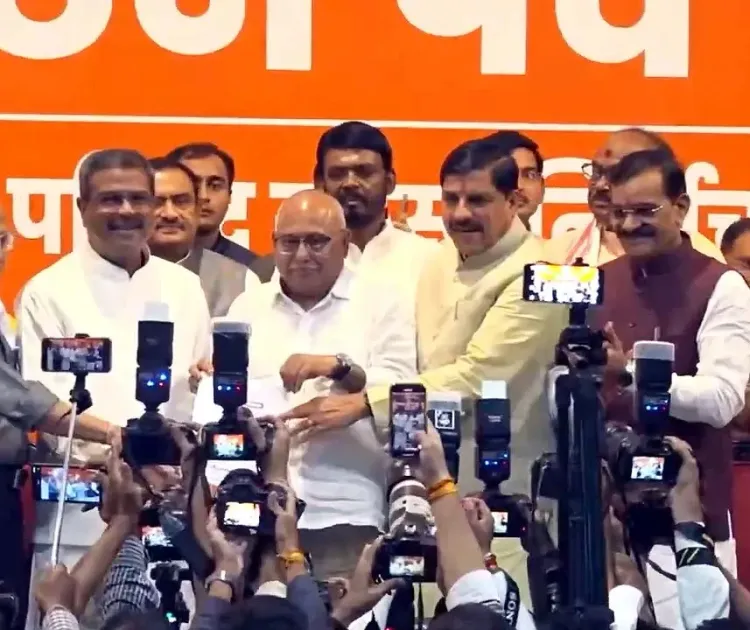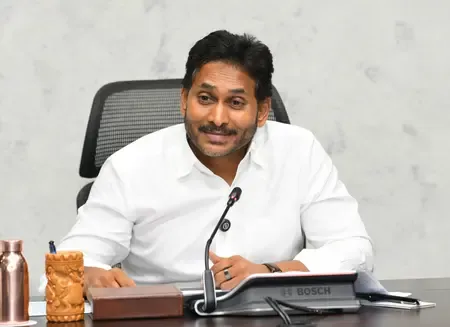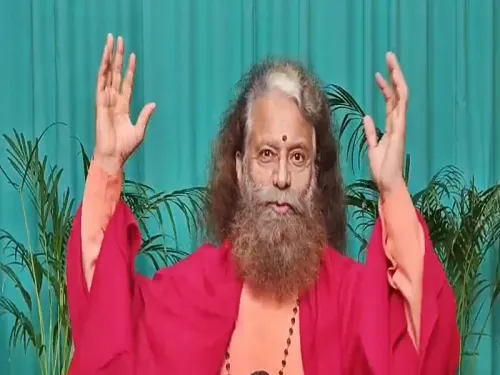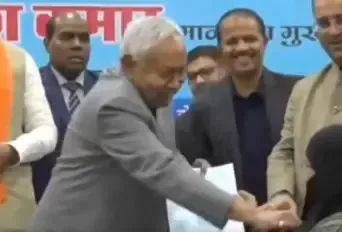Is Hemant Khandelwal the New Leader of Madhya Pradesh BJP?

Synopsis
Key Takeaways
- Hemant Khandelwal appointed as new Madhya Pradesh BJP president.
- Uncontested election reflects party unity.
- Focus on grassroots leadership and organizational strength.
- Strategic alignment with government objectives.
- Historical significance as only the second leader from central region to hold the position.
Bhopal, July 2 (NationPress) In a significant development for the Madhya Pradesh BJP, Hemant Khandelwal, the representative from Betul, has taken charge as the leader of the party's state unit, succeeding Khajuraho MP V.D. Sharma, who served for over five years.
This transition, marked by a unanimous decision and lack of competition, signifies not just a leadership shift but a strategic repositioning of the party, reinvigorating legislative influence at the organizational level.
Union Minister Dharmendra Pradhan confirmed that Khandelwal was the only nominee for the role, with his candidacy rigorously vetted. “There was only one nomination, and Hemant Khandelwal received unanimous support. Following thorough verification, I am delighted to announce him as the new president of the Madhya Pradesh BJP,” Pradhan stated, offering his congratulations.
Khandelwal’s uncontested rise reflects a resurgence of legislative leadership within the party, a dynamic not observed for almost two decades. The announcement was made during a high-level gathering at the BJP’s state headquarters in Bhopal, where Pradhan, in his role as election in-charge, was accompanied by election officer Vivek Shejwalkar and observer Saroj Pandey.
This announcement coincides with the party's ongoing internal election process, which has already seen 1,100 out of 1,313 organizational circles complete their polls, alongside 62 district units. Furthermore, 44 national representatives have been elected, highlighting the BJP's efforts to consolidate its organizational framework ahead of significant political events.
Chief Minister Dr. Mohan Yadav, outgoing president V.D. Sharma, and several senior leaders were present during the event.
Khandelwal, a two-time MLA and former Lok Sabha member from Betul, submitted his nomination on Tuesday with the presence of top party leaders. With no other candidates, his election was effectively sealed on that day. The nomination process was conducted ceremoniously, with CM Mohan Yadav personally supporting Khandelwal at the stage to file his papers, a gesture that emphasized the chief minister's endorsement. The nomination was backed by senior leaders, including V.D. Sharma and Shivraj Singh Chouhan.
This leadership change comes as the BJP is reconfiguring its organizational setup in anticipation of the national presidential election. Khandelwal’s appointment is viewed as a strategy to enhance coordination between the party and the government, especially since both he and CM Yadav are current MLAs with strong associations to the RSS.
His grassroots-oriented and low-profile persona is expected to resonate well with party workers, particularly following a phase characterized by more prominent leadership.
Khandelwal’s political heritage and organizational acumen have been instrumental in his ascent.
The son of the late Vijay Khandelwal, a four-time Parliament member from Betul, Hemant entered politics through a by-election in 2008. He later served as the BJP's district president in Betul and currently leads the Kushabhau Thakre Trust.
This marks only the second occasion that a leader from the central region of Madhya Pradesh has been appointed to the state presidency, the first instance being Shivraj Singh Chouhan in 2005.
Historically, the Malwa-Nimar region has produced the most state presidents, followed by Gwalior-Chambal and Mahakaushal.
Khandelwal’s ascension thus introduces a new element to the regional balance within the party's leadership framework. The BJP's internal election mechanism, which is anchored in its constitution, emphasizes consensus and organizational discipline.
Khandelwal’s uncontested appointment embodies this principle, with the party leadership coalescing around a candidate perceived as both unifying and strategically aligned with the contemporary political landscape.
As the BJP gears up for its next chapter of national leadership, Khandelwal’s term is expected to prioritize organizational consolidation, empowerment of the cadre, and reinforcing the party’s grassroots connection in Madhya Pradesh.










